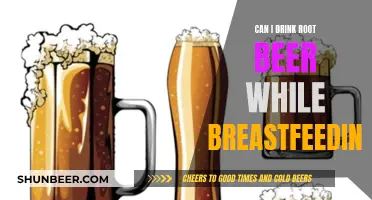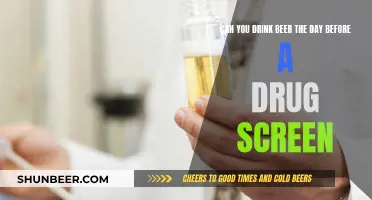
Drinking beer and losing weight is possible, but it requires dedication and a good understanding of calorie intake and burning. Beer can contribute a lot of calories, and it is challenging to determine which beers are high or low in calories as this information is not always available on the container or in calorie trackers. However, as a general rule, the higher the alcohol content, the more calories the drink will contain. Therefore, switching to light beer can be a good way to reduce caloric intake. Additionally, drinking water between alcoholic drinks and being mindful of portion size can help reduce calorie intake from alcohol. It is also important to be mindful of the calories from mixers in cocktails and the effect of alcohol on appetite and food choices.
| Characteristics | Values |
|---|---|
| Is it possible to drink beer and still lose weight? | Yes, but it is harder to create a caloric deficit. |
| How to drink beer and still lose weight? | Drink light or low % ABV beer. Reduce portion size. Drink less frequently. Choose lower-carb beers. |
| Calories in beer | One beer contains 153 calories. A craft beer, like Blue Moon, for example, has 171 calories. |
| Calories in alcohol | The higher the alcohol content of a beverage, the more calories. |
| Calories in mixers | Mixers can contain upwards of 35g of sugar, which is 7 teaspoons. |
| Alcohol and weight gain | Alcohol reduces your inhibitions and stimulates your appetite. |
What You'll Learn

Calories in/calories out: burn more calories than you consume
Weight loss is a complex topic, and while it is indeed possible to lose weight while still drinking beer, it is important to understand the role that calories play in the process.
The concept of "calories in/calories out" is based on the law of thermodynamics and energy balance within the human body. Simply put, if you consume more calories than you burn, you will gain weight, and if you burn more calories than you consume, you will lose weight. This is often referred to as a "caloric surplus" or "caloric deficit," respectively.
To lose weight, you need to ensure that your body is in a caloric deficit. This means that you are consuming fewer calories than your body needs, forcing it to dip into its stored energy sources, such as body fat, to make up for the deficit. This can be achieved by reducing your daily calorie intake, increasing physical activity, or a combination of both.
When it comes to drinking beer, it's important to remember that beer contributes a significant number of calories. The exact amount depends on the brand, type, and size of the beer. For example, a regular Budweiser contains about 40% more calories than Budweiser Light. Higher alcohol by volume (% ABV) beers tend to have higher calories. A good rule of thumb is that for every 1% ABV, there are approximately 30 calories. So, a 12-ounce can of beer with 5% ABV would contain approximately 150-200 calories.
To incorporate beer into your weight loss plan, consider the following strategies:
- Choose light or low % ABV beers: Opting for beers with lower alcohol content can significantly reduce your calorie intake.
- Reduce portion sizes: Use smaller glasses or choose cans instead of bottles.
- Drink less frequently: Limit your beer consumption to weekends or special occasions.
- Cut carbs: If you're following a low-carb diet, choose lower-carb beers like Michelob Ultra or Corona Premier.
- Track your calories: Use a calorie-tracking app to log your beer consumption and ensure it fits within your daily calorie allowance.
While it is possible to lose weight while drinking beer, it requires diligence and a good understanding of your calorie intake and expenditure. Additionally, it's important to remember that beer provides empty calories, lacking nutritional value. Therefore, it is essential to prioritise a balanced diet and ensure your body is getting all the nutrients it needs.
The Science Behind Beer Koozies: Do They Really Work?
You may want to see also

Drink light or low % ABV beer
Drinking light or low-percentage ABV beer is a good way to continue drinking beer while trying to lose weight. The higher the alcohol content of a beverage, the more calories it contains. Therefore, opting for a light beer or a beer with a lower alcohol content will reduce the number of calories you consume.
The alcohol content of a beer is expressed as a percentage of alcohol by volume (%ABV). The higher the %ABV, the higher the calories. Beers with a lower %ABV will generally be lower in calories. For example, a Budweiser regular beer (5% ABV) contains about 40% more calories than a Budweiser Light beer.
It is worth noting that the calories in beer come not only from alcohol but also from unfermented carbs and a small amount of protein. Therefore, another way to reduce your calorie intake when drinking beer is to choose lower-carb beers.
In addition to drinking light or low %ABV beers, there are other ways to continue drinking beer while trying to lose weight. These include reducing your portion size, drinking less frequently, and being mindful of the total number of calories you consume.
Alcohol-Free Beer and Metronidazole: Is It Safe?
You may want to see also

Reduce portion size: use a smaller glass or opt for a 12-ounce can instead of a 16-ounce bottle
It is possible to lose weight while still drinking beer, but it is challenging. Beer can contribute a lot of calories, and it is often paired with high-calorie foods, making it harder to create a caloric deficit.
One way to continue drinking beer while losing weight is to reduce your portion size. Using a smaller glass or opting for a 12-ounce can instead of a 16-ounce bottle can help you cut down on calories. This simple switch can help your body burn alcohol more quickly and keep your daily calorie intake in check.
Another strategy is to choose lower-calorie beers. Light beers, for example, have fewer calories than regular beers. According to the USDA, a light beer has 103 calories, compared to 153 calories in a regular beer. Additionally, light beers contain about half the carbohydrates of regular beers, and lower-carb diets are often associated with weight loss.
It is also important to be mindful of how often you drink beer. Drinking less frequently, such as only on weekends, can help you reduce your overall calorie intake. This way, you can still enjoy a cold one without derailing your weight loss goals.
In addition to choosing lower-calorie beers, you can also pair your beer with low-calorie snacks. Opt for foods high in protein and fat, as these can slow your body's absorption of alcohol, making you feel less drunk and less prone to overindulgence.
By combining portion control, lower-calorie options, and mindful drinking habits, you can enjoy a beer while still losing weight.
Concussion and Beer: A Dangerous Mix?
You may want to see also

Drink less frequently, such as only on weekends
If you're trying to lose weight but don't want to give up drinking beer, one option is to drink less frequently, such as only on weekends. This can help you create a calorie deficit, which is necessary for weight loss.
Drinking beer in moderation can be part of a weight loss plan, but it's important to be mindful of the number of calories in beer and how it can impact your overall calorie intake. Beer can contribute a lot of calories, especially if you're drinking multiple beers in one sitting or drinking high-ABV beers.
To reduce your calorie intake, you can also choose light or low-ABV beers, which have fewer calories and carbohydrates. Another strategy is to reduce your portion size by using a smaller glass or choosing a 12-ounce can instead of a 16-ounce bottle.
It's worth noting that the relationship between alcohol and weight loss is complex. While alcohol itself contains calories, the combination of alcohol and sugars found in mixers or bar food is often what inhibits weight loss and potentially causes weight gain. Additionally, alcohol can affect your appetite, sleep quality, and metabolism, all of which can impact your weight loss journey.
If you want to include beer in your weight loss plan, it's important to be mindful of your overall calorie intake, practice moderation, and make informed choices about the types of beer and mixers you consume.
Paxlovid and Beer: Is It Safe to Mix?
You may want to see also

If cutting carbs, choose lower-carb beers
If you're cutting carbs but still want to enjoy a beer, there are a few lower-carb options to choose from. While traditional beer is made with malted barley, hops, yeast, and water, low-carb beers are often brewed with distinct enzymes that break down the carbohydrates into alcohol. This means that, while you're still consuming carbs, there are fewer left in the final product.
Some lower-carb beers to look out for include:
- Corona Premier: With 90 calories and 2.6 grams of carbohydrates in a 12-ounce bottle, Corona Premier has fewer calories and carbs than its counterpart, Corona Light.
- Budweiser Select 55: With just 55 calories and 2 grams of carbohydrates per serving, this is Budweiser's lightest option.
- Miller Lite: Packing only 3.2 grams of carbohydrates in a 12-ounce bottle and maintaining a standard ABV of 4.2%, Miller Lite has been advertised as "the original light beer" since 1975.
- Michelob Ultra Pure Gold: With 85 calories and 2.5 grams of carbohydrates in a 12-ounce bottle, this beer has a slightly better nutrition profile than the traditional Michelob Ultra.
- Beck's Premier Light: With only 3.9 grams of carbohydrates and a 2.3% ABV per 12-ounce serving, Beck's Premier Light is a good option if you're looking for moderation in both carbs and alcohol content.
- Amstel Light: With 95 calories and 5 grams of carbohydrates per serving, Amstel Light is about in the middle for low-carb beers. It's also light on the palate and quite refreshing.
Beer and Covid Shots: What You Need to Know
You may want to see also
Frequently asked questions
Yes, it is possible to drink beer and lose weight, but it is harder to create a caloric deficit if you drink every day.
If you are trying to lose weight, there are ways to reduce calories and still enjoy a beer from time to time:
- Drink light or low % ABV beer.
- Reduce your portion size.
- Drink less frequently.
- If cutting carbs, choose lower-carb beers.
Here are some tips to help you enjoy the occasional beer and still achieve your weight loss goals:
- If you drink, don’t go overboard.
- Pick a healthier drink option.
- Hydrate, hydrate, hydrate.
- Don’t skip your usual workout.
- Don’t skip meals (but don’t go too heavy either).
Here are some low-calorie beers to choose from:
- Budweiser Select 55.
- Corona Premier.
- Bud Light (110 calories).
- Michelob Ultra.
- Dry Irish stout (Guinness Draught is 125 calories per 12oz).
- Brut champagne.
- Vodka, soda and lime.
- Tequila over ice with 2 juiced limes & a dash of soda.
In addition to choosing low-calorie beers, here are some other things to consider:
- Calories in the mixers of cocktails pose a greater barrier to weight loss than the actual alcohol.
- Alcohol reduces your inhibitions and stimulates your appetite, so plan ahead and prepare low-calorie snack options.
- Drink one glass of water for every beer you drink, as alcohol is a diuretic and can dehydrate you.







